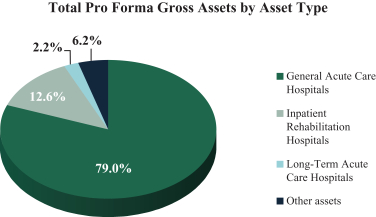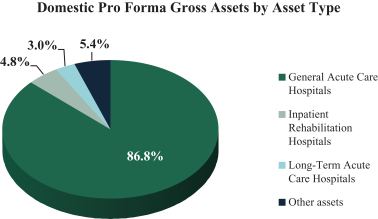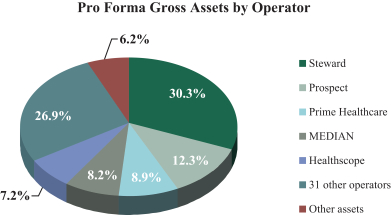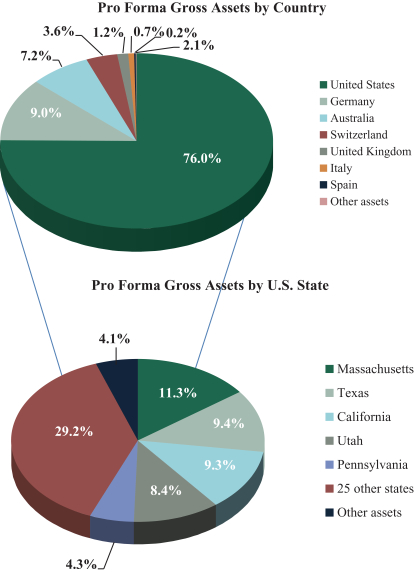U.S. FEDERAL INCOME TAX CONSIDERATIONS
This section summarizes the current material federal income tax consequences to Medical Properties and the Operating Partnership generally resulting from the treatment of Medical Properties as a REIT. Because this section is a general summary, it does not address all of the potential tax issues that may be relevant to you in light of your particular circumstances. Baker, Donelson, Bearman, Caldwell & Berkowitz, P.C., or Baker Donelson, has acted as our counsel, has reviewed this summary (except with respect to the general summary of material U.S. federal income tax considerations contained under the heading “U.S. Federal Income Tax Considerations—Taxation of Noteholders”), and is of the opinion that the discussion contained herein fairly summarizes the federal income tax consequences that are material to a holder of our common stock. The discussion does not address all aspects of taxation that may be relevant to particular securityholders in light of their personal investment or tax circumstances, or to certain types of securityholders that are subject to special treatment under the federal income tax laws, such as insurance companies,tax-exempt organizations, financial institutions or broker-dealers, andnon-United States individuals and foreign corporations.
The statements in this section of the opinion of Baker Donelson, referred to as the Tax Opinion, are based on the current federal income tax laws governing qualification as a REIT. We cannot assure you that new laws, interpretations of law or court decisions, any of which may take effect retroactively, will not cause any statement in this section to be inaccurate. You should be aware that opinions of counsel are not binding on the Internal Revenue Service (“IRS”), and no assurance can be given that the IRS will not challenge the conclusions set forth in those opinions.
This section is not a substitute for careful tax planning, nor does it constitute tax advice. We urge you to consult your own tax advisors regarding the specific federal, state, local, foreign and other tax consequences to you, in the light of your own particular circumstances, of the purchase, ownership and disposition of shares of our common stock, our election to be taxed as a REIT and the effect of potential changes in applicable tax laws.
Taxation of Our Company
We were previously taxed as a subchapter S corporation. We revoked our subchapter S election on April 6, 2004 and we have elected to be taxed as a REIT under Sections 856 through 860 of the Internal Revenue Code of 1986, as amended (the “Code”), commencing with our taxable year that began on April 6, 2004 and ended on December 31, 2004. In connection with this prospectus, our REIT counsel, Baker Donelson, has opined that, for federal income tax purposes, we are and have been organized in conformity with the requirements for qualification to be taxed as a REIT under the Code commencing with our initial short taxable year ended December 31, 2004, and that our current and proposed method of operations as described in this prospectus and as represented to our counsel by us satisfies currently, and will enable us to continue to satisfy in the future, the requirements for such qualification and taxation as a REIT under the Code for future taxable years. This opinion, however, is based on factual assumptions and representations made by us to Baker Donelson concerning our organization, our proposed ownership and operations, and other matters relating to our ability to qualify as a REIT, and is expressly conditioned upon the accuracy of such assumptions and representations.
We believe that our proposed future method of operation will enable us to continue to qualify as a REIT. However, no assurances can be given that our beliefs or expectations will be fulfilled, as such qualification and taxation as a REIT depends upon our ability to meet, for each taxable year, various tests imposed under the Code as discussed below. Those qualification tests involve the percentage of income that we earn from specified sources, the percentage of our assets that falls within specified categories, the diversity of our stock ownership, and the percentage of our earnings that we distribute. Baker Donelson will not review our compliance with those tests on a continuing basis. Accordingly, with respect to our current and future taxable years, no assurance can be given that the actual results of our operation will satisfy such requirements. For a discussion of the tax consequences of our failure to maintain our qualification as a REIT, see “—Requirements for Qualification—Failure to Qualify”.
27





